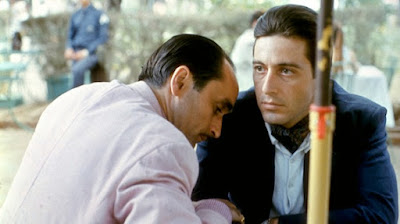December 20, 1974 [The Godfather, Parts I and II]
 Francis Ford Coppola says the Godfather movies are more about a family than about the Mafia--so what happens to the Mafia? Does it become a metaphor? For what? The world the family has to live in? The politics that surrounds them? The America they have inherited--or made? All right, I'll play along; I can dig social/political theory, even at the movies.
Francis Ford Coppola says the Godfather movies are more about a family than about the Mafia--so what happens to the Mafia? Does it become a metaphor? For what? The world the family has to live in? The politics that surrounds them? The America they have inherited--or made? All right, I'll play along; I can dig social/political theory, even at the movies.But how can I ignore Fredo, hunched in the background, flinching under his father’s love, his brothers’ passions--hot and cold--and him stepping sideways just once, like a small crab, and crunched underfoot for it? Yes, it’s a family’s story--but it seems reverse-Biblical, the jealous brother not the murderer this time but the victim, the father’s love tarnished with pride--all the other sins following, shoring up the hull, building the haunted ship.
Haunted is right: The movies start dark, and Part II gets darker, the black sea-monster humps of post-war automobiles giving way to the false sunlight of Tahoe and Havana--but always, as in The Great Gatsby, they sit in “boats against the current, borne back ceaselessly into the past.” The second part of the movie does grow golden at times, looking at the Don as a child--then dustier as a man (Robert De Niro fooling all of us--wasn’t he a simple-minded, terminally ill baseball player just last year?)--until Michael kneels before his mother, the two of them in the dark, looking back--the images juxtaposed, christening and hits, the wedding-dance trailing out longer and thinner until it becomes a funeral procession.
 --And moping along in the rear, not even the corpse up front, is Fredo--ah, the genius of casting John Cazale, the perfect little mook next to all those groomed Corleones. No wonder he liked Vegas and Cuba so much: The lights were turned up all the way, driving the shadows back for a little while--where Michael waited, wiping his mouth with a clean handkerchief, bowed down too late in remorse.
--And moping along in the rear, not even the corpse up front, is Fredo--ah, the genius of casting John Cazale, the perfect little mook next to all those groomed Corleones. No wonder he liked Vegas and Cuba so much: The lights were turned up all the way, driving the shadows back for a little while--where Michael waited, wiping his mouth with a clean handkerchief, bowed down too late in remorse.


Comments
Post a Comment